myCILEx
Welcome to myCILEx
CILEx’s exclusive members area

myCILEx provides you with information on the work CILEx is doing on behalf of its members.
For the latest branch events in your area, visit: www.cilexbranches.org.uk
Mindfulness and meditation
CILEx CEO Mandie Lavin writes:
I recently attended a professional regulation seminar, and the lead speaker started the session by describing how they had risen to the rank of silk and had overcome great adversity to achieve their personal and professional goals. A major contributor to their success had been silencing their greatest critic: this was not their partner, their friends or even their family, it was themself. They had done this by spending time on mindfulness and meditation. This speech really had an impact on me, and off I went to find out more.
As you embark on a project, job or course of study, it is very easy to listen to your inner voice telling you how hard this will be and setting in train doubts about whether you will be able to do it before you even get started. In striving for perfection, we can allow unrealistic expectations to immobilise us, and sometimes that can stop us getting going at all.
Our lives often swirl into a vortex of activity as we try to balance the demands of home, work, study and friends. More can often be achieved by doing less: in standing back and planning, or delegating to others and recognising that our own high standards may not necessarily be met, our lives may become less stressful.
As for mindfulness, well I must say I have been impressed: stopping to tune in and focus your awareness on the present moment, while calmly acknowledging and accepting your thoughts and feelings, takes you on a journey of empowerment and strengthens your resilience.
Meditation has previously seemed like nothing more than some mystical concept to me. Over the years, I have purchased many books on the subject from charity shops; I have even transported them on holiday, and they returned with me, unread. Now I have found out that I am meditating without even realising it. In addition, I have been spreading the word; at a recent family dinner, when a debate was heading into difficult territory, I suggested that we all just have a moment of silence to regroup and be calm, and it worked!
Many of our members and students that I have met over the last year have exceeded their own expectations - and others’ expectations of them - and we have profiled them, and shared their life stories, in the pages of the Journal. We all have ways of tackling challenges, getting ourselves organised and silencing our critics (be they ourselves or others).
However, I would recommend this mindfulness business, which has helped me and it might help you: applying it at work and recognising the times when it might be of benefit is the beginning, and then using it will soon become second nature. Taking just a few minutes each day to pray, meditate, relax, listen to music or just sit in a lovely, warm bubble bath will wash away your cares and leave you feeling ready to climb that career ladder, break through the glass ceiling and be an extremely successful professional. You can do it!
Introducing the CILEx Benevolent Fund
Simon Wells, a lay trustee and vicechairperson of the CILEx Benevolent Fund, writes: This is the first of a monthly series of features from CILEx Benevolent Fund. This fact will be news to many readers of CILEx Journal – not about the features themselves but because, according to research we conducted recently, only 57% of you even know that CILEx has a Benevolent Fund. This figure is disappointing, but what is perhaps even more worrying is that only 21% of you actually know what the Benevolent Fund does.
I am one of five trustees who are responsible for the running of the fund, and we are aware that these statistics indicate that we have something of a mountain to climb in terms of increasing awareness among the CILEx membership. But we need to start somewhere, so let us start here with the basics.
Like all charities, we have a stated aim: the fund’s vision is to provide access to relevant guidance, information and support to CILEx members in England and Wales, who find themselves in an unavoidable financial hardship.
Again, like every charity, we have eligibility criteria:
- To be eligible to apply to the fund, applicants must be a current or former member of CILEx or a dependant of a current or former member of CILEx.
- Applicants must also have been a member of CILEx for a minimum of one year before applying.
And, as you would expect, there are some exceptions to the help we can provide. The trustees are not able to consider applications for assistance with membership fees; student course fees; the costs of joining CILEx; discharge of outstanding judgments; HM Revenue and Customs tax bills; or individual voluntary arrangements or bankruptcy.
So, we have some fairly strict rules but, within them, we are able to provide a wide range of financial help to current and former CILEx members or dependants who find themselves in difficulty . We don’t have millions of pounds on which to draw to do this, but we have funds to provide assistance at times when they make a real difference to people.
At the moment, the number of people we help is quite small - perhaps one a month - but, as trustees, we see it as our duty to try to expand the activities of the fund. This means that we need to both raise more money and increase awareness of our services, and their range, so that we receive more applications.
Our view is that CILEx is not just a membership organisation but a professional family, and the fund provides a way for everyone to work together to provide a mutual means of support for those who find themselves in tricky circumstances.
Over the next few issues of CILEx Journal, we’ll be talking more about the way in which members perceive the fund; where we would like to take it in the future; and the role you might be able to play in helping us achieve these goals.
We’ll also be telling you more about ourselves as trustees. Our role is very much about serving you through serving the Benevolent Fund, so it is important that we hear what you have to say. You can contact us at the e-mail address below, and we’re very much looking forward to it.
- E-mail : benevolentfund@cilex.org.uk
Walk to support access to justice!
Can you help your region’s Legal Support Trust to provide access to justice for poor and vulnerable people? If so, sign up for one of many sponsored Legal Walks to help people in need.
CILEx will be supporting the afterwork walks, which will be led by senior members of the judiciary, local law societies, the Bar Council and by national figures in the legal world.
You and/or your colleagues can help to raise funds for local advice services by signing up to walk - as an individual or a team - to raise money to support access to justice.
- Details of upcoming Legal Support Trust fundraising activities and events will appear in future issues of the Journal.
- To contact your regional walk organiser and register as a team or an individual, visit: www.cilex.org.uk/pdf/Legal-Walks-2016.pdf
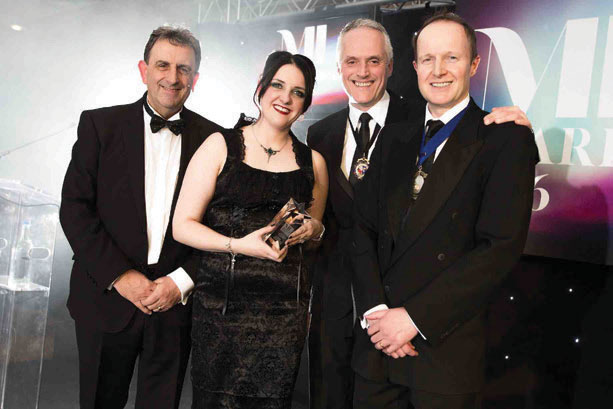
Rachel Stevens crowned CLE of the Year… again
For the second consecutive year, Rachel Stevens was named ‘Chartered Legal Executive of the Year’ at the Manchester Legal Awards in March. Rachel, who practises at Keoghs, is also chairperson of the Greater Manchester CILEx branch (see page 40 of this issue). In 2015, Rachel won the award while working at Weightmans LLP.
After receiving her prize, Rachel said: ‘It is a great honour to win such a prestigious award for the second time. Further to my work as a Chartered Legal Executive with Keoghs, I have spent the last three years with CILEx helping other Chartered Legal Executives in the Greater Manchester area. I hope to carry on this work whilst also continuing my professional growth with Keoghs.’
Five go on tour of ‘legal London’
Five CILEx students embarked on a tour of ‘legal London’ organised by our local MP, Karl McCartney, and his assistant, Mel Barratt, in late 2015. The students: Truan Cannings; Jemma Burt; Ellie Jones; Charlotte Needham; and I are all employed at Sills & Betteridge LLP, in Lincoln, alongside eight other CILEx students. We were accompanied by Rachel MacLean, the firm’s training partner; John Mitchell, a managing partner, and Kelly Credland, the HR manager.
The first stop on our trip was a tour of the Houses of Parliament. We were able to visit both the chambers of the House of Lords and the House of Commons. It was incredible to think that we were walking in the footsteps of the thousands of MPs who have passed through parliament since it began in 1215, following the signing of the Magna Carta in our hometown of Lincoln.
The history of the buildings is astounding, with the decor and furnishings reflecting the changing styles throughout the centuries. It was also interesting to note that some of the processes via which bills pass through parliament are as archaic as the buildings themselves, with the MPs literally voting with their feet! Even today, they are required to physically move to a different room, within a set time, to record their vote. Many of us were tempted to apply to become a lord or lady when we discovered that, alongside hereditary peers and life peers, you can apply online to be a member of the House of Lords. We were also surprised to discover that the Houses of Parliament is so big it contains several post offices , bars, restaurants, a travel agent and even a hair salon!
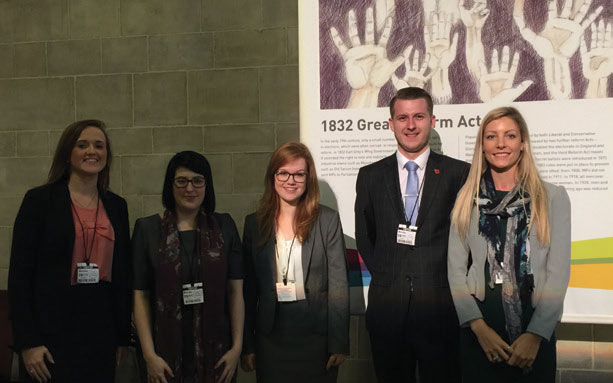
Our trip then took us through Inner Temple, an Inn of Court, so we could see where many barristers are called to the Bar. Following this, we went via the Royal Courts of Justice where many complex civil, criminal and family cases, including those involving international child abduction, are heard; these are all areas of law in which Sills & Betteridge specialise and many of the CILEx students work within these departments.
We were then kindly welcomed by barristers’ chambers 7 Bedford Row, with afternoon tea, where we met many of the barristers and legal clerks who have close ties to our firm. It was very interesting to hear about the kinds of work that these barristers undertake, especially as it is so different to the work we carry out in the office!
The day was a great success and thoroughly enjoyed by all. As a CILEx student, it was a fabulous opportunity to gain greater understanding of how the whole process of the legal system fits together, an experience that many CILEx students may not be able to have. We would like to thank Karl McCartney, as well as Sills & Betteridge, for organising the whole day and for their continued support in our studies.
FAQ
Question: Can I use the CILEx logo?
Answer: No. The CILEx logo must not be used by anyone without permission.
CILEx is a professional body, and an awarding organisation and Approved Regulator. Therefore, we have many duties and boundaries, one of which is a duty to protect the public interest. The display of our logo on letterheads, websites or publicity literature suggests that CILEx approves or endorses the services offered by a company or firm.
Because CILEx wants to help and encourage branches, accredited centres, firms and learning partners to show their association with us, we have created some logos which are tailored to show such associations. However, these can only be used if we give express permission. You should consider our logo usage policy and identity guidelines for more details.*
Those practitioners who have been authorised for practice rights to conduct litigation, advocacy, conveyancing or probate, or to provide immigration advice and services, are entitled to use the CILEx Regulation ‘specialist lawyer’ logo, provided they do so in conjunction with the corresponding professional title. If you have any further questions on the use of the CILEx Regulation specialist lawyer logo or regulatory statements, you should contact CILEx Regulation direct.
* See: www.cilex.org.uk/pdf/Logo%20Policy%20May%202015%20final.pdf and www.cilex.org.uk/pdf/CILEx-Logo-Identity-Guidelines _2014.pdf respectively.
Cardiff and SE Wales branch annual dinner
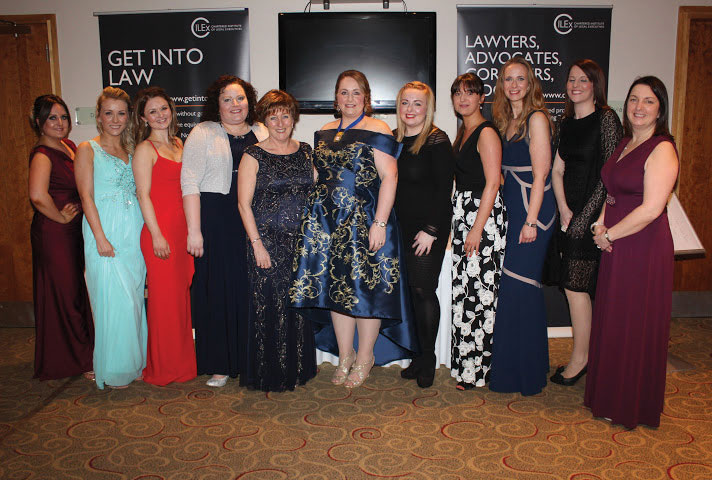
The Cardiff and South East Wales branch held its annual dinner in February at the St David’s Hotel & Spa in Cardiff. CILEx members, colleges, major law firms, barristers, judges, solicitors, members of CILEx council, the North Wales police and crime commissioner, recruitment agencies, law societies, members of the local junior lawyer division, students, CILEx centres, and other branch chairpersons were among the 134 guests who attended the event.
The evening was a great success, and included the recognition - during an awards ceremony - of local students. A number of the student prize winners were accompanied by their employer, and the awards served as a gentle reminder about the hard work that student employees had put into their studies and were an opportunity for students to acknowledge the support they received from employers.
The dinner took place in a fantastic setting and included a magician, drinks reception, four-course meal - with wine on the tables - tribute artist, disco, sweet cart and even midnight bacon butties. The branch was very lucky to have support from local businesses: Emma Waddingham sponsored the drinks reception; Yolk Recruitment sponsored the midnight bacon butties (which are always a huge success); Brightlink Learning sponsored one-third of the student tickets, ensuring that the students did not miss the opportunity to attend; and Civitas Law gave us a very generous donation to award the students with a cash prize and certificates. We would like to say a massive ‘thank you’ to all our sponsors for their help and contributions throughout the year.
Gtr Manchester branch AGM
The Greater Manchester branch AGM took place in February, and the following officers were appointed: chairperson, Rachel Stevens; secretary, Hazel Needham; treasurer, Saada Ali; membership secretary, Martine Delaney; media secretary, Mateusz Bartok; and social media secretary, Michelle Hall.
- If you are interesting in joining the Greater Manchester Branch, e-mail : manchestercilex@outlook.com
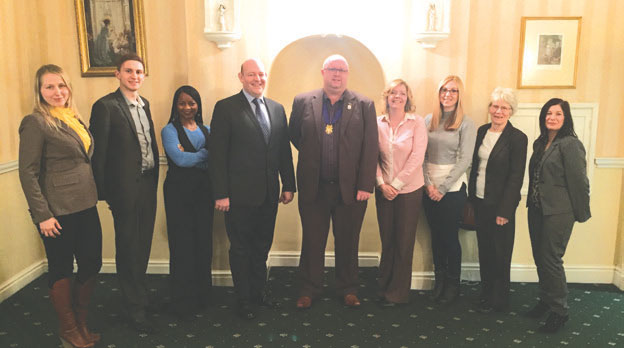
Chester and North Wales branch AGM
The Chester and North Wales branch held its AGM at Rossett Hall Hotel, in Wrexham, in February. The AGM marked the end of an era for Alison Stace, as she handed the baton of chairperson to Matthew Foster. The branch would like to thank Alison for all her hard work as chairperson over the past three years, and to wish Matthew all the best in his new role.
In attendance were Martin Callan, CILEx vice-president , and Richard Doughty, public affairs officer at CILEx, who had both travelled some distance to join the branch for its AGM. Following the meeting, Martin and Richard joined the members of the branch for a meal, which was thoroughly enjoyed by all. The branch would like to thank Martin and Richard for travelling to join us.
Campaigning for justice to be done: an update
CILEx student member, Charlotte Henry, describes how the ruling in R v Jogee [2016] UKSC 8 and Ruddock v the Queen (Jamaica) [2016] UK PC 7 will help her fight to reform the law of joint enterprise after the murder conviction, under this common law doctrine, of her brother. See also page 48 of this issue.
In 2014, after an incident in August 2013, my brother Alex Henry was convicted of murder and grievous bodily harm under Offences Against the Person Act 1861 s18, under the law known as joint enterprise, and sentenced to a minimum tariff of 19 years’ imprisonment (for the facts of Alex Henry’s case, see ‘Campaigning for justice to be done’ , (2015) October CILExJ p37).
Since that awful day in 2013, my family have campaigned with Joint Enterprise Not Guilty by Association (JENGbA) to keep joint enterprise in the public eye and on the political agenda. ‘Joint enterprise’ is an everyday phrase used to describe a situation whereby two or more people can be convicted for the same crime. It is a common law doctrine, meaning that it was created in the courts and has evolved throughout time, with each judgment widening its application further. Joint enterprise can be used for all criminal offences, the most controversial of which is murder.
There are three distinct types of joint enterprise. The first is known as ‘joint principles’ , which is where two or more people come together to commit the same offence.
The second type of joint enterprise is known as ‘assisting and encouraging’ , which is where the principle offender commits an offence and another person known as the ‘secondary offender’ intentionally assists or encourages that offence.
The third type of joint enterprise, and perhaps the most controversial, is known as ‘parasitical liability’ . This form of joint enterprise was established in the decision in Chan Wing-Siu v the Queen [1985] AC 168, which lowered the mens rea for murder in secondary offenders from one of intent to the far lower threshold of ‘foresight’ of what might occur. It was this type of joint enterprise that was challenged at the Supreme Court in the case of R v Jogee.
The first question that the Supreme Court considered in R v Jogee was whether it is fair that a secondary offender can be convicted on the basis of what they foresaw as ‘possible’ . The second question the Supreme Court considered was whether joint enterprise overcriminalises secondary parties, and JENGbA intervened to help the Supreme Court answer this. It is clear that secondary offenders are overcriminalised by joint enterprise as, regardless of the involvement in the fatal incident, the principle offender and the secondary offender will be condemned to a life sentence with a minimum tariff of imprisonment, as stated in Criminal Justice Act 2003 Sch 21: the entire tariff must be served before the secondary offender can apply for parole.
On 18 February, when the Supreme Court judgment was handed down, we all sat on the edge of our seats, bodies rigid with fear. The years of heartache and fighting all boiled down to this moment - our nails digging into the palms of our hands - as we listened patiently and quietly wondered whether this would be like hearing ‘guilty’ all over again. The Supreme Court ruled in our favour, and it was unanimous. We were right all along. The justices agreed that the court took a wrong turn in Chan Wing-Siu : foresight was not sufficient to find a conviction for murder, and there must be a common, shared intention to kill or inflict serious harm, officially abolishing parasitical liability.
The Court of Appeal contacted our legal team the very next day, and it was game on again - the fight was not over. Alex is one of the lucky ones as this momentous judgment was delivered before his case had exhausted the appeal system; therefore, Jogee now forms a ground of appeal. The trial judge had misdirected the jury in his case, as in thousands of other cases, but whether it rendered the verdict ‘unsafe’ is something we will have to argue.
But what about the other cases? This decision is not automatically retrospective, and there are thousands of cases which have exhausted the appeal system. Are the potentially innocent men, women and children to languish in prison because a court, 30 years ago, took a ‘wrong turn’ ? This is a question that JENGbA demands an answer to. If we are all truly innocent until proven guilty, but what was once ‘guilt’ has been wrong all along, then we cannot sit quietly and let the injustice pass us by. We have pledged to fight for an enquiry into all of the cases, so the truly guilty can be captured and the innocent will walk free.
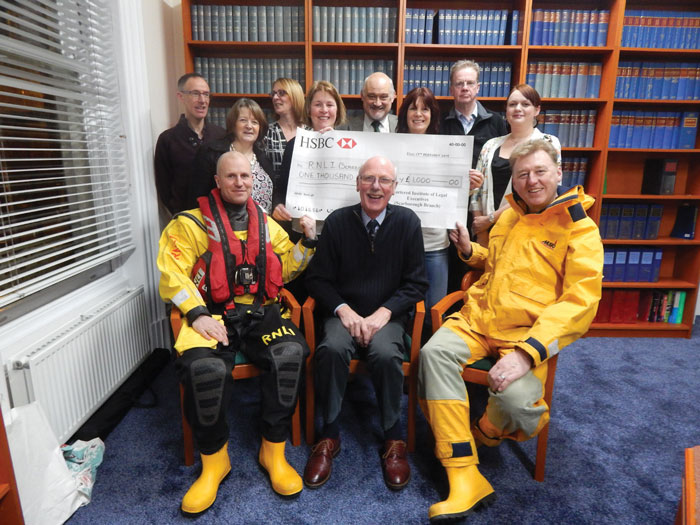
Fundraising success for Scarborough branch
At the first meeting of the Scarborough branch, in February 2015, it was decided to hold fundraising efforts to benefit a local charity, and the Scarborough Royal National Lifeboat Institution (RNLI) was chosen. The Scarborough branch has 20 members and, in its first year, has managed to raise a fantastic £1,000. The cheque was presented to representatives of the Scarborough RNLI at the Scarborough branch AGM, which was held on 19 February 2016.
Celebrating apprenticeships
This year’s National Apprenticeship Week (NAW) - from 14 March to 18 March - celebrated how apprenticeships ‘can take you anywhere’ . CILEx Journal assesses the state of play.
Over 700 separate events were held across the country as part of the ninth NAW, which took place recently, including a three-day conference in Birmingham and a National Apprenticeship Show in Milton Keynes in Buckinghamshire. As with previous years, the aim was to raise awareness and encourage greater take-up of apprenticeships among both young people and employers.

The annual event, organised by the Skills Funding Agency (SFA), part of the Department for Business, Innovation and Skills (BIS), is also a celebration of what apprentices can achieve. In that vein, this year’s theme was how apprenticeships ‘can take you anywhere’ and how they can enable young people to ‘rise to the top’ . With this focus in mind, the government was keen to demonstrate that apprenticeships are not only a means to completing ‘beginner’ standards, but they also cover higher or even degree-level qualifications. At a conference held by Policy UK, Carl Creswell, deputy director for Routes into Apprenticeships and Work at the joint BIS/Department for Education Apprenticeships Directorate, explained: ‘Forty per cent of apprenticeship standards are for higher and degree apprenticeships. There are apprentices at all levels; this is not just about ‘admin jobs’ .’
This is true for legal services where there are now legal apprenticeships which will take an apprentice all the way to being a Fellow of CILEx or a solicitor (a smattering of organisations, such as ITV and City firm, Mayer Brown, are now offering such pathways).
It is also the case that apprenticeships do convert into long-term , permanent positions, as demonstrated by the experience of apprentices attending CILEx Law School (CLS), a major provider of legal apprenticeship training. Jenny Pelling, business director at CLS, says: ‘Since we started [in 2013] we have seen how firms really do take on their apprentices: firms of the calibre of Bond Dickinson, DAC Beachcroft and Addleshaw Goddard continue to sponsor them along the CILEx route.’
Rise to the top
In keeping with this year’s focus, the question is whether apprentices do ‘rise to the top’ . It is too soon to say whether they will do so for the legal apprenticeships because they have only been up and running since 2013 (and the new Trailblazers ‘Apprenticeships in Law’ only kicks off this September). But at least the notion of a legal apprentice is catching on: CILEx currently has 565 apprentices at 212 different employers (including company in-house , private practice and public sector employers).
If one looks at sectors outside legal, it is evident that apprentices do often reach to the top of their trade. Many household names were, once upon a time, apprentices, including John Caudwell who owns mobile phone company, Phones 4u, but who started life as a Michelin apprentice; Jamie Oliver, who was once a catering apprentice; and David Beckham who was part of the class of 1992 at Manchester United on a youth training scheme.
Perhaps, however, potential candidates do not have these heady aspirations for fame and fortune, but do want to know that an apprenticeship opens doors. In a survey carried out by BIS from 2014, where it interviewed 5,000 apprentices, 83% of respondents said that their career prospects had ‘improved’ as a result of their apprenticeship.
What the Apprentices say
Stephen Gowland
‘I would never have got to where I am now without starting as an apprentice,’ says Stephen Gowland, past president of CILEx (2013/14), who runs his own successful personal injury firm, ILS Solicitors, in the North East. Stephen Gowland completed an employment training scheme when he was 17 years old with the firm JP Hall, at the end of which he was offered a full-time role. Fast forward a few years and he had completed his CILEx training, and then his solicitor qualifications, and in 2004 set up his own firm. Stephen Gowland believes that the employment training scheme ‘set me up completely’ and that he would ‘never have even considered’ a career in the law until his apprenticeship changed such an attitude forever.
Zachary Coleman
Zachary Coleman shows how legal apprenticeships are not just for those interested in becoming lawyers. He is completing his apprenticeship with Bradley Saul Solicitors in Oxfordshire, and is doing his training with CILEx Law School. His ultimate aim is to run a non-pro fit organisation involved in performing and creative arts, and sees the apprenticeship as a pivotal step towards that: ‘My work experience and this apprenticeship are serving to give me the legal and business skills needed to set up my [sic] own organisation, whilst advancing my academic knowledge …. [It] can be a stable and effective way to … acquire relevant and transferrable skills.’ He adds: ‘Apprenticeships … can set you up for a wide range of other directions, career-wise . It definitely doesn’t limit you in terms of options.’
Levy-headed
There is no doubt that apprenticeships are a growing trend with political weight: the government has pledged to create three million new apprenticeships by 2020. A new ‘apprenticeship levy’ is likely to be introduced for all employers with an annual payroll in excess of £3m. The levy is a payment into the Treasury coffers set at 0.5% of the employer’s gross wage bill. In return, employers will get vouchers to cover the costs of training apprentices. Jenny Pelling says: ‘Law firms are accepting that the levy is on its way and it will motivate firms; they will want to make use of their vouchers.’
With a legal sector in transition mode, the new legal apprentice makes an interesting chapter in that story.
We welcome your website feedback!
- What do you like most about the website?
- What do you dislike most about the website?
- What enhancement would you like on the website?
Over the next six- to 12-month period, we will be working to enhance the website for all our users. So, please do let us know what you think - your feedback is valuable.
All feedback that is shared will be collated and reviewed as part of the development work we are undertaking. We would love to hear from you!
Please e-mail your feedback to: media@cilex.org.uk